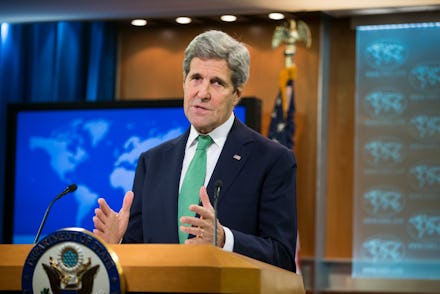The U.S. Accused ISIS of Genocide — So When Will We Acknowledge the Genocide on U.S. Soil?

On Thursday, following the House of Representatives' unanimous vote, United States Secretary of State John Kerry declared that the actions of the Islamic State group constitute not only terrorism, but genocide.
Given the Islamic State organization's unspeakably violent record, few would argue with the designation. In Kerry's press conference, he denounced ISIS for committing war crimes with the intent to wipe out Shias, Yazidis and Christians by means of sexual slavery, forced conversions and mass murder. Still, the statement raised a pressing question for some — when will the U.S. government acknowledge its own genocide?
"I think before the U.S. goes out and points fingers at other atrocities around the world, they should come to light and recognize the atrocities they've committed over the centuries against Native Americans," Raymond Uses The Knife, a member of the Cheyenne River Sioux Tribe, told Mic.
"No president has ever apologized to me and my people for all of their atrocities."
The National Congress of American Indians estimates that approximately 10 million Native Americans inhabited the U.S. in 1500. By 1900, that population had fallen to 237,000.
The decimation of more than 95% of the Native American population over 400 years could quite possibly fulfill the United Nation's definition of genocide. While it was disease brought over by European settlers that proved most deadly, a number of historical accounts suggest settlers intentionally infected Native Americans by distributing smallpox-ridden blankets and handkerchiefs, and called such outbreaks the will of God. There was the forcible removal of Native children from their parents for conversion to Christianity in federal boarding schools; the sterilization of over 3,000 women against their will; and major historical events like the Trail of Tears, during which 4,000 Cherokee people died.
There have been initiatives to recognize the violent history of the U.S. and Native peoples by way of national museum exhibits, and cities which have replaced Columbus Day with Indigenous People's Day. Former president Richard Nixon provided some of the strongest legislation supporting Native Americans during his time in office, helping to pass the Indian Self-Determination and Education Assistance Act in 1975.
But even so, the U.S. government has never acknowledged the systematic slaughter of Native Americans as a genocide by definition.
Read more: 125 Years Later, Native Americans Are Still Fighting to Take Back Wounded Knee
Though likening ISIS' present-day genocide to one seemingly of the past may feel like comparing apples and oranges, Ray Ramirez, a staff member at the Native American Rights Fund, told Mic it's not much of a stretch.
"There's no doubt about it: The things that people are complaining about ISIS — beheadings and mutilations and cultural genocides — happened here," Ramirez said. "And they're happening now: Just look at the desecration and destruction of tribal sacred sites."
Ramirez pointed to Arizona, where the Apache fought to defend a spiritual site that, in 2015, the U.S. Department of Defense turned over to a mining company.
"When the U.S. goes to war, they try to protect those country's sacred sites, even though they're bombing the hell out of them otherwise. They don't do the same thing here," he said.
What's more, Ramirez said Native Americans are the "most ignored" when it comes to basic needs like education and health care. And it's costing them their lives: The Indian Health Services website reports that the life expectancy of American Indians and Alaska Natives is 4.4 years shorter than that of all other U.S. race populations.
Deputy Director of the Simon-Skjodt Center for the Prevention of Genocide Naomi Kikoler told ABC News that Kerry's Thursday announcement could have a few outcomes: The United Nations Security Council could involve the International Criminal Court and bring up local governments on charges. The U.S., she said, may also begin to keep its own meticulous records on ISIS violence and maintain them as evidence.
"It will take years to build those cases," said Kikoler.
It's even more unclear what it would look like for the U.S. government to act on an acknowledgement of a genocide on which its nation was founded.
"It would be like saying, 'I apologize for stepping on your foot but I'm not going to get off your foot.'" John Dossett, General Counsel at the National Congress of American Indians, told Mic. Any words, he said, would have to be followed by action.
"There are only so many tribes, they're in specific locations, they have specific histories and records and the federal government could fix these problems and work with them to reach solutions," said Dossett. "It's not impossible to do."